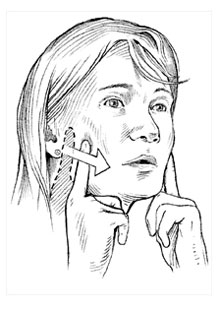Do You Have TMJ? Take the Home Test

Illustration: Joe McKendry
Frequent headaches? Ear pain? The cause may be a TMJ disorder, a condition that often goes undiagnosed.
The sufferers are primarily women, and there are 10 to 30 million of them: They develop a snap, crackle, or pop in the jaw—and it isn't their cereal. They have a temporomandibular joint (TMJ) disorder. If any part of the TMJ system of muscles, tissues, ligaments, and bones dislocates or becomes inflamed, the disorder can result. Experts aren't completely sure what causes the problem. It may be a chronic clenching or grinding of teeth, or trauma to the jaw from, say, a root canal (when you have to keep your mouth open wide for an extended period), or whiplash. Arthritis may play a part, yet for a significant number of people, TMJ disorders begin for no obvious reason.
Some of the symptoms—headache and ear pain, for example—can be mistaken for migraines or ear infections. Other symptoms include neck pain, a clicking or popping sound when you open or close your mouth, and jaws that catch or lock up. You can do a simple self-diagnosis by using the test on this page, suggested by James Fricton, DDS, a professor in the division of TMJ disorders and orofacial pain at the University of Minnesota School of Dentistry.
Most of the time, sufferers can find relief by reducing the amount of wear and tear to the joint. Your dentist might suggest avoiding chewing gum and may prescribe a nighttime bite guard to minimize clenching and grinding. Some people find relief with muscle relaxation techniques, but for chronic sufferers, prescription drugs or even surgery (to repair or even replace the joint) may be recommended.
The Test: While opening your jaw slightly, place a finger over the joint in front of your ear, and then open wide until you can feel the joint move. If you feel the joint click or if it's tender when you press, you may have a temporomandibular joint (TMJ) disorder.
As a reminder, always consult your doctor for medical advice and treatment before starting any program.



